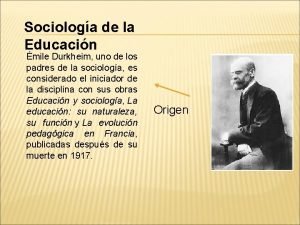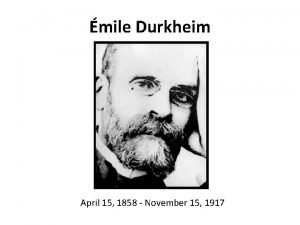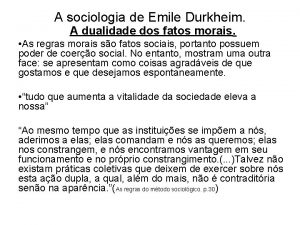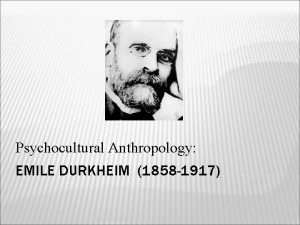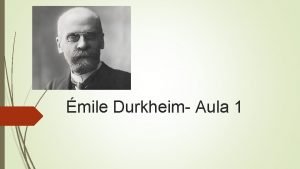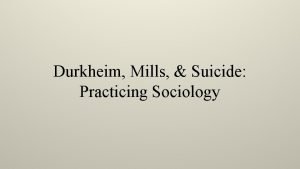Religion What is Religion According to Durkheim religion











- Slides: 11

Religion

What is Religion? • According to Durkheim, religion is the beliefs and practices separating the profane from the sacred, uniting supporters into a moral community – Sacred- aspects of live having to do with the supernatural that inspire awe, reference, deep respect, or deep fear – Profane- the ordinary aspects of everyday life

Religion defined by 3 elements • Beliefs that some things are sacred (forbidden, set off from profane) • Practices (rituals) concerning things that are considered sacred • A moral community (such as a church) resulting from a group’s beliefs and practices

Functionalist Perspective • Religion performs functions such as: – Answering questions about ultimate meaning • The purpose of life, why people suffer) – Uniting believers into a community that shares values and perspectives – Provides guidelines for life – Controlling behavior – Providing support for the government – Spearheading social change • War and religious persecution are dysfunctions of religion

Symbolic Interactionist Perspective • Religions use symbols to provide identity and social solidarity for members – For members these aren’t ordinary symbols, but sacred and a condensed way of communicating with others • Rituals are ceremonies or repetitive practices that unite people into a moral community – Symbols and rituals develop from beliefs – Beliefs include values • Religious experiences is a sudden awareness of the supernatural or a feeling of coming in contact with God

Conflict Perspective • Conflict theorists are highly critical of religion • Karl Marx called religion the “opium of the people” because he believed that the workers escape into religion – Argued that religion diverts the energies of the oppressed from changing their circumstances • believers focus on the happiness they will have in the coming world rather than on their suffering in this world • Religious teachings and practices reflect society's inequalities

Types of Religious Groups • A cult is a new religion with few followers, whose teachings and practices put it at odds with the dominant culture and religion – All religions began as cults – Cults emerge with the appearance of a charismatic leader – Each cult meets with rejection of society • Message is seen as a threat to the dominant culture

Types of Religious Groups • Sect- larger than a cult but still feels substantial hostility from and towards society – If it grows, its members tend to become respectable in society and it changes into a church • Church- large, highly organized religious group with formal services – Highly bureaucratized – New members come from within the church

Types of Religious Groups • Ecclesia- religious group that is so integrated into the dominant culture that it is difficult to tell where one begins and the other leaves off

Religion in the US • Membership – Highest in the South and Midwest – Each religious group draws members from all social classes • Most top –heavy: Episcopalian and Jews • Most bottom-heavy: Baptist and Evangelicals – All major religions draw from various racial and ethnic groups • Hispanic or Irish are likely to be Roman Catholic • Greek are likely to be Greek Orthodox • African Americans likely to be Protestant – Membership rate increases with age

Characteristics of religious groups in US • No state church, no ecclesia, no single denomination dominates • Religions compete with one another for membership • Fundamentalist revival today bc mainstream churches fail to meet basic religious needs of people • Electronic Churches- televangelists, online services
